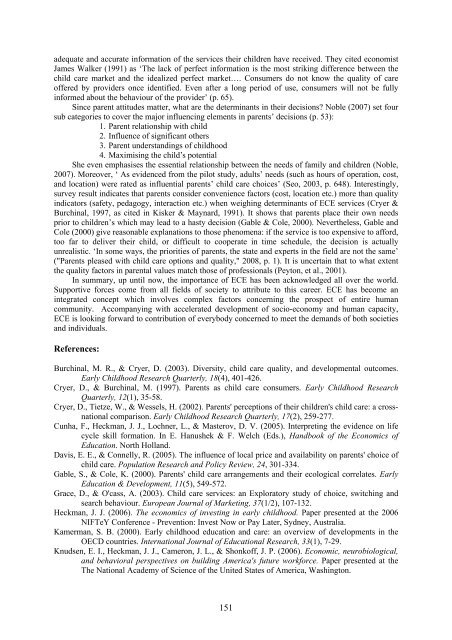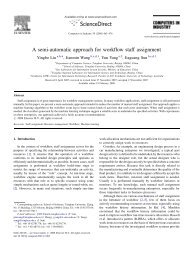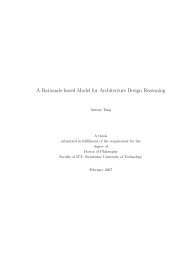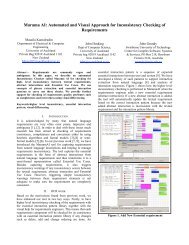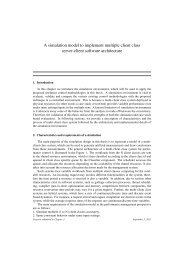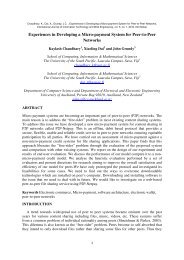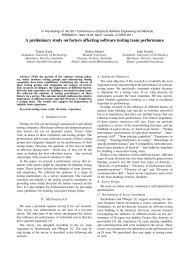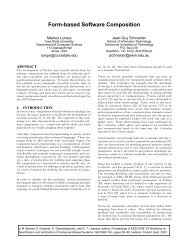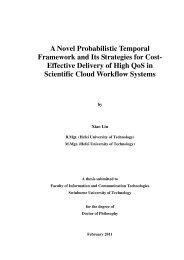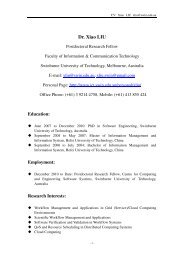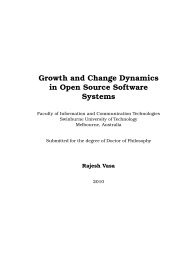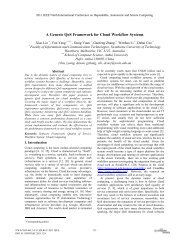Workshop proceeding - final.pdf - Faculty of Information and ...
Workshop proceeding - final.pdf - Faculty of Information and ...
Workshop proceeding - final.pdf - Faculty of Information and ...
Create successful ePaper yourself
Turn your PDF publications into a flip-book with our unique Google optimized e-Paper software.
adequate <strong>and</strong> accurate information <strong>of</strong> the services their children have received. They cited economist<br />
James Walker (1991) as ‘The lack <strong>of</strong> perfect information is the most striking difference between the<br />
child care market <strong>and</strong> the idealized perfect market…. Consumers do not know the quality <strong>of</strong> care<br />
<strong>of</strong>fered by providers once identified. Even after a long period <strong>of</strong> use, consumers will not be fully<br />
informed about the behaviour <strong>of</strong> the provider’ (p. 65).<br />
Since parent attitudes matter, what are the determinants in their decisions? Noble (2007) set four<br />
sub categories to cover the major influencing elements in parents’ decisions (p. 53):<br />
1. Parent relationship with child<br />
2. Influence <strong>of</strong> significant others<br />
3. Parent underst<strong>and</strong>ings <strong>of</strong> childhood<br />
4. Maximising the child’s potential<br />
She even emphasises the essential relationship between the needs <strong>of</strong> family <strong>and</strong> children (Noble,<br />
2007). Moreover, ‘ As evidenced from the pilot study, adults’ needs (such as hours <strong>of</strong> operation, cost,<br />
<strong>and</strong> location) were rated as influential parents’ child care choices’ (Seo, 2003, p. 648). Interestingly,<br />
survey result indicates that parents consider convenience factors (cost, location etc.) more than quality<br />
indicators (safety, pedagogy, interaction etc.) when weighing determinants <strong>of</strong> ECE services (Cryer &<br />
Burchinal, 1997, as cited in Kisker & Maynard, 1991). It shows that parents place their own needs<br />
prior to children’s which may lead to a hasty decision (Gable & Cole, 2000). Nevertheless, Gable <strong>and</strong><br />
Cole (2000) give reasonable explanations to those phenomena: if the service is too expensive to afford,<br />
too far to deliver their child, or difficult to cooperate in time schedule, the decision is actually<br />
unrealistic. ‘In some ways, the priorities <strong>of</strong> parents, the state <strong>and</strong> experts in the field are not the same’<br />
("Parents pleased with child care options <strong>and</strong> quality," 2008, p. 1). It is uncertain that to what extent<br />
the quality factors in parental values match those <strong>of</strong> pr<strong>of</strong>essionals (Peyton, et al., 2001).<br />
In summary, up until now, the importance <strong>of</strong> ECE has been acknowledged all over the world.<br />
Supportive forces come from all fields <strong>of</strong> society to attribute to this career. ECE has become an<br />
integrated concept which involves complex factors concerning the prospect <strong>of</strong> entire human<br />
community. Accompanying with accelerated development <strong>of</strong> socio-economy <strong>and</strong> human capacity,<br />
ECE is looking forward to contribution <strong>of</strong> everybody concerned to meet the dem<strong>and</strong>s <strong>of</strong> both societies<br />
<strong>and</strong> individuals.<br />
References:<br />
Burchinal, M. R., & Cryer, D. (2003). Diversity, child care quality, <strong>and</strong> developmental outcomes.<br />
Early Childhood Research Quarterly, 18(4), 401-426.<br />
Cryer, D., & Burchinal, M. (1997). Parents as child care consumers. Early Childhood Research<br />
Quarterly, 12(1), 35-58.<br />
Cryer, D., Tietze, W., & Wessels, H. (2002). Parents' perceptions <strong>of</strong> their children's child care: a crossnational<br />
comparison. Early Childhood Research Quarterly, 17(2), 259-277.<br />
Cunha, F., Heckman, J. J., Lochner, L., & Masterov, D. V. (2005). Interpreting the evidence on life<br />
cycle skill formation. In E. Hanushek & F. Welch (Eds.), H<strong>and</strong>book <strong>of</strong> the Economics <strong>of</strong><br />
Education. North Holl<strong>and</strong>.<br />
Davis, E. E., & Connelly, R. (2005). The influence <strong>of</strong> local price <strong>and</strong> availability on parents' choice <strong>of</strong><br />
child care. Population Research <strong>and</strong> Policy Review, 24, 301-334.<br />
Gable, S., & Cole, K. (2000). Parents' child care arrangements <strong>and</strong> their ecological correlates. Early<br />
Education & Development, 11(5), 549-572.<br />
Grace, D., & O'cass, A. (2003). Child care services: an Exploratory study <strong>of</strong> choice, switching <strong>and</strong><br />
search behaviour. European Journal <strong>of</strong> Marketing, 37(1/2), 107-132.<br />
Heckman, J. J. (2006). The economics <strong>of</strong> investing in early childhood. Paper presented at the 2006<br />
NIFTeY Conference - Prevention: Invest Now or Pay Later, Sydney, Australia.<br />
Kamerman, S. B. (2000). Early childhood education <strong>and</strong> care: an overview <strong>of</strong> developments in the<br />
OECD countries. International Journal <strong>of</strong> Educational Research, 33(1), 7-29.<br />
Knudsen, E. I., Heckman, J. J., Cameron, J. L., & Shonk<strong>of</strong>f, J. P. (2006). Economic, neurobiological,<br />
<strong>and</strong> behavioral perspectives on building America's future workforce. Paper presented at the<br />
The National Academy <strong>of</strong> Science <strong>of</strong> the United States <strong>of</strong> America, Washington.<br />
151


